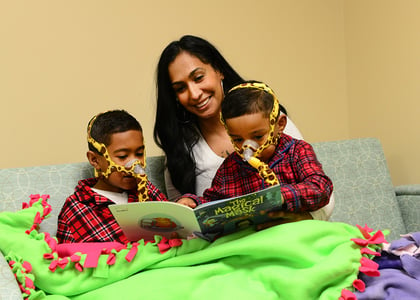A positive airway pressure device helps kids breathe easier by delivering pressurized air. It keeps the airway open during sleep.
How they work:
- Your child wears a mask over their nose or nose and mouth.
- A motor blows air through a tube and into the mask.
- Air pressure helps keep the airway open and supports breathing.
There are a few options for devices. Your doctor will talk you through the best options for your child.
CPAP machine
A CPAP machine is set at a pressure that stays the same when your child breathes in and out.
Your child may need CPAP if:
Bilevel positive airway pressure (BiPAP) machine.
A BiPAP machine gives higher-pressure air when the child breathes in. It can also give a child a breath if there is a pause in breathing.
Your child's doctor may prescribe BiPAP if:
- They have OSA and they didn't tolerate CPAP.
- They have weakness from a disease like muscular dystrophy.
- They have diseases that stop the lungs from expanding as fully as they should.
- They have central sleep apnea, which is when the brain doesn't send signals to breathe.
- They have other breathing problems during sleep.
Home ventilator with a mask
A home ventilator can work as a positive airway pressure device. It can also breathe for the child. Some kids need to use a home ventilator with a mask instead of a CPAP or BiPAP machine.
Reasons for this treatment:
- Your child is too small or young to use CPAP or BiPAP.
- They have severe lung disease or central sleep apnea.
- There is a power outage and they need a battery-powered device.
- They need advanced ventilator modes or settings.
- They have a need for daytime mouthpiece ventilation.
If your child’s lung or neuromuscular disease is severe, they may need a home ventilator with a tracheostomy.





